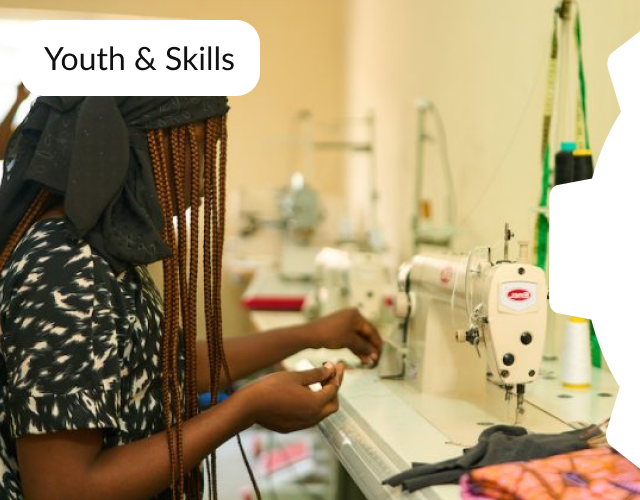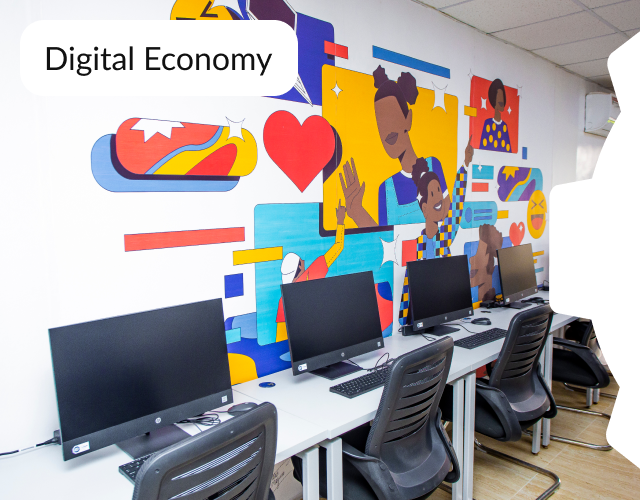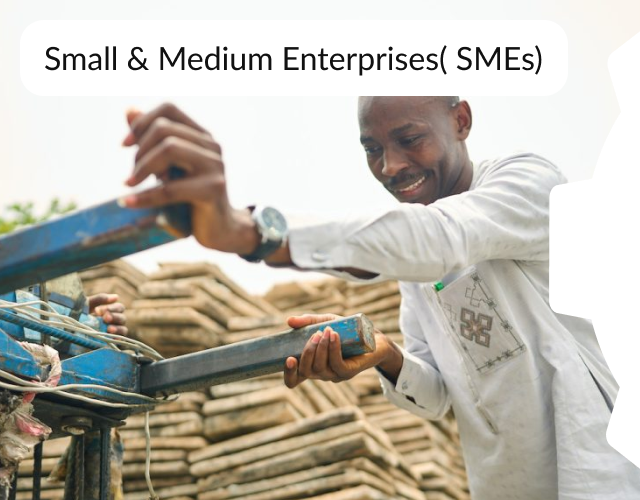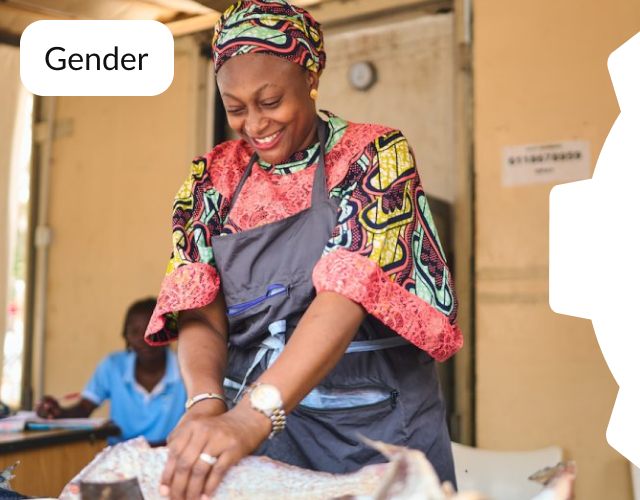

Product Development
Developing dedicated products and programmes for each thematic area with focus on financial and technical assistance services.
Impact Reporting
Design monitoring and evaluation systems for measuring and reporting the interventions under each thematic area.
Incentives


Goal
What does boi intend to achieve

Finance building retrofits, appliance upgrades, and smart grid technologies for domestic and industrial uses

Target investments in waste management infrastructure and innovative solutions that promote resource recovery and waste-to-wealth generation towards transition to a circular economy

Partner with climate activists and NGOs in create awareness of the consequences of climate change through policy advocacy and community outreach.

Support research and development of new clean energy technologies that can address Nigeria’s local needs

Prioritize investments in large-scale green energy efficiency, sustainable agriculture, and climate-resilient infrastructure, sectors crucial for decarbonization and adaptation. This includes hydropower plants, biomass-to-power, waste-to- power, solar and wind farms, to contribute substantially to the national energy grid
Quantify the amount of green house gases emissions avoided or prevented through improvements in energy efficiency
Track the increase in renewable or green energy capacity.
Evaluate the increase in the number of individuals or businesses gaining access to financial services through digital channels.
Monitor the area of lands protected or restored through improved climate -resilient practices


50%
Out of ∼200 million people in Nigeria, 50% are aged below 35 years and below
100%
increase in UN projects growth of 400 million by 2050 - a staggering increase in 30years
74%
of the global youth population by 2035, will be in ten countries, nine in Sub-Saharan Africa, one of which is Nigeria.
Goal
What does boi intend to achieve

Deploy technology to enable youths’ access to quality job opportunities

Provide access to cheaper financial products through the development of a specialised loan product for youth businesses.

Contribute to the quality of education and vocational training curricula for improved employability of youth

Develop, sponsor & and run the BOI Youth Innovation and Development Conference aimed at together 100+ youth innovative and tech-run businesses to showcase their business idea

Invest in the education and skills of Nigerian youth for increased productivity
Track number of young people enrolled in skills development programs, disaggregated by gender, location, and socio-economic background.
Assess the relevance and effectiveness of skills training programs based on industry needs, employer feedback, and trainee
Nigeria Track the rate of employment and business creation among youth who have completed skills training programs.
Track the number of youth who have been able to access loan facilities for their businesses from the Bank or other financial institutions


~6%
of the digital economy has contributed to total GDP and is expected to grow and reach at least ~12% by 2050.
Goal
What does boi intend to achieve

Collaborate with research institutions to facilitate the exploration of emerging trends like artificial intelligence, scientific computing, and human-computer interaction

Drive investment in digital infrastructure such as broadband networks, fibre optic cables, and data centres, bridging the digital divide and connecting underserved communities.

Finance innovative digital businesses and entrepreneurs to connect them with international markets through a thriving e-commerce ecosystem. Also, support early-stage and growing digital businesses, particularly in sectors like fintech, e-commerce, and agri-tech

Develop, sponsor & and run the BOI Youth Innovation and Development Conference aimed at together 100+ youth innovative and tech-run businesses to showcase their business idea

Increased Investment in technical assistance and capacity-building programs and resources to equip individuals and businesses with the digital skills needed to thrive in the digital economy.
Evaluate the impact on job creation within the digital ecosystem, including direct and indirect employment opportunities
Measure the percentage of the target population or businesses that have adopted digital solutions offered by the Bank.
Evaluate the increase in the number of individuals or businesses gaining access to financial services through digital channels.
Track the success of digital literacy programs and training initiatives supported by the Bank to enhance the digital skills of the target audience


50%
to national GDP
96%
businesses accounted for
76.5%
of employments
8%
to exports
Goal
What does boi intend to achieve

Increase in value of SME Market Share

Promote industrialization of SMEs, especially those involved in manufacturing and other industrial activities.

Increase in Local Raw Materials/Content Development in Nigeria

Increase in Value, Quality and Quantity of SME Export
Evaluate the increase in the number of SMEs transitioning to Medium & Large businesses
Analyze the extent to which SMEs participate in supply chains for large industries' exports, both as direct suppliers and through intermediate links
Evaluate increase in number of SME Businesses In Nigeria
Evaluate increase in number of SME Businesses In Nigeria


Goal
What does boi intend to achieve

Invest in modular refineries to aid the local refining of petroleum products and its attendant by-products

Facilitate an indigenous airport infrastructure to improve Nigeria’s access to Africa and the world

Investment in alternative power solutions such as renewable energy / solar parks to energize off-grid locations across Nigeria

Support the establishment of free trade zones / manufacturing hubs to provide the basic infrastructure required by enterprises to ease production, and enhance product and service export across various sectors of the economy

Facilitate an efficient rail system across the geopolitical zones to boost trade, logistics, movement of goods and services, and expedite development in local areas
Number of goods and services moving through rail, ports and roads
Percentage of rural areas transformed into urban centers
Number of solar parks / locations powered by alternative energy solutions
Growth of service / logistics businesses servicing the various infrastructure


48%
of women’s income are allocated to food and 52% to investments (EFInA, 2022)
.
Nigeria's future growth prospect is linked to improved economic outcomes for women. This can be greatly achieved through increased access to formal financial services, educational and business literacy skills.
Goal
What does boi intend to achieve

Strengthen its public policy advocacy role for gender equality in the labour market, education, business and political space

Establish a dedicated fund and product for women with a focus on ensuring easy access to finance, collateral security, capacity building, mentorship sessions, market opportunities and formalization of businesses.

Deepen its play by mainstreaming gender lens investing principles and creating a Gender Strategy to actively support women’s economic empowerment issues

Drive strategic partnerships and collaborations with MDAs, International Organisations, and Women Organisations to deepen funding and technical assistance opportunities
Track the increase in women's access to financial services, land ownership, and participation in businesses
Track the increase in the number of informal businesses owned by women transitioning and registering as formal businesses
Evaluate the number of women attending business capacity training sessions
Track the increase in women's participation in community decision-making processes and leadership roles
Access our single-digit interest loans as well as expert advisory support for your business. First, your register as a customer, then you apply and we will take it from there. Click here to contact us if you have additional questions.